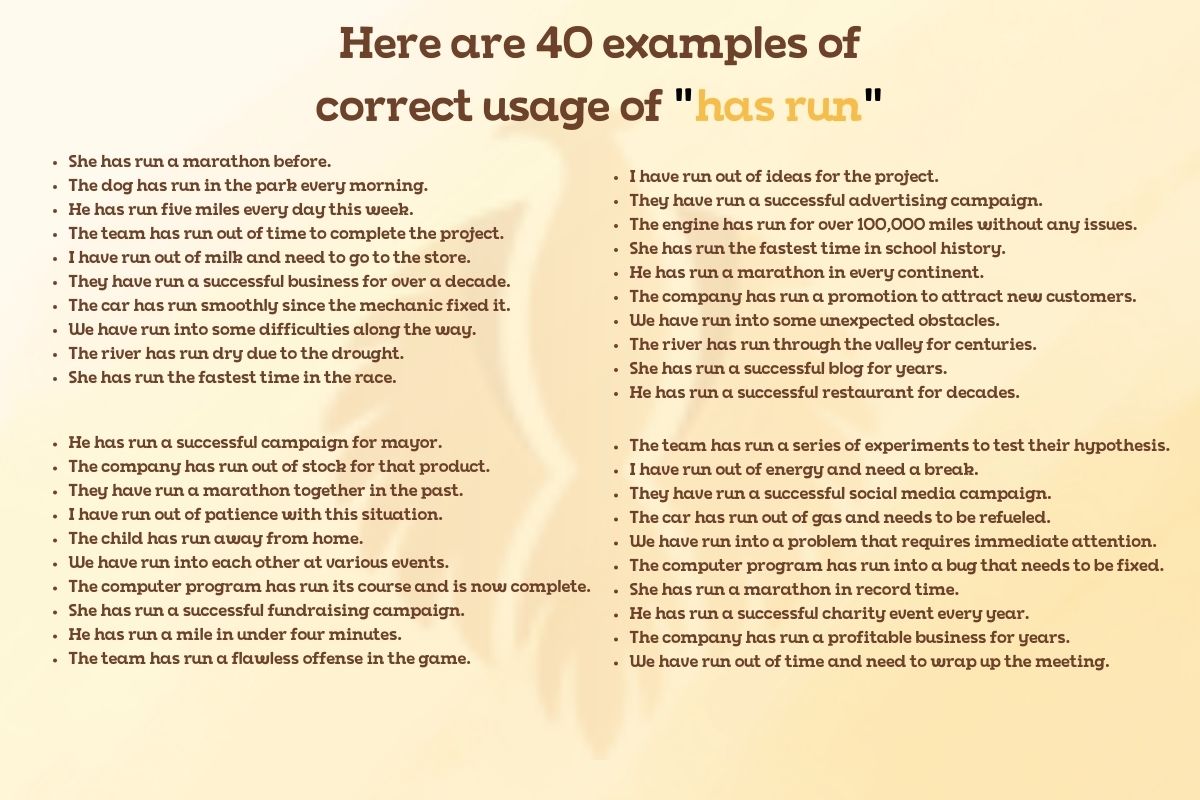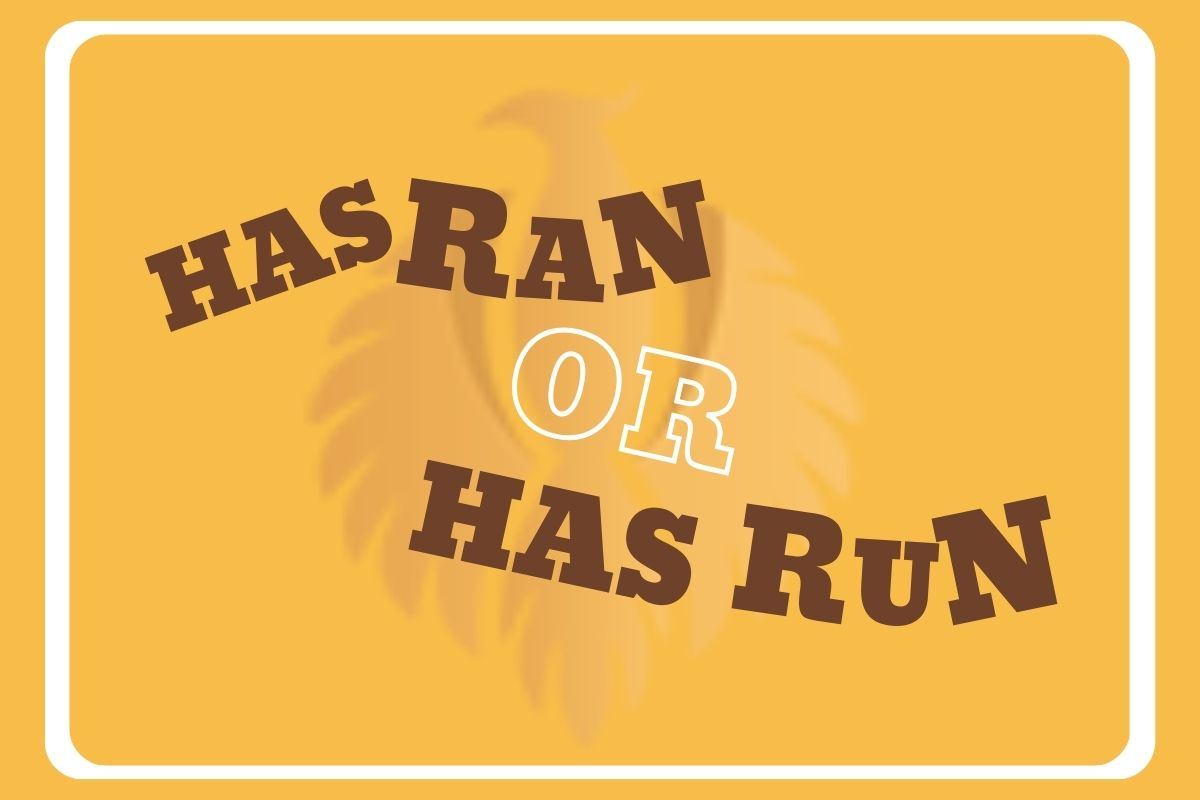Welcome to this article on the topic of “Has Ran or Has Run.” In the English language, understanding the correct usage of verb tenses is crucial for effective communication.
One area that often poses a challenge is distinguishing between “ran” and “run” when combined with the auxiliary verb “has” in the present perfect tense.
In this article, we will explore the nuances of using “has run” and “has ran” in different contexts.
I have encountered numerous students who struggle with this concept.
Therefore, I will present you with a series of sentences that I frequently use in my classes to help students grasp the correct usage of these verb forms.
By delving into these examples, you will gain a deeper understanding of how to construct sentences using “has run” appropriately.
This knowledge will not only enhance your language skills but also enable you to express yourself more accurately and confidently in both spoken and written English.
So, let’s dive in and explore the intricacies of “has ran” versus “has run” to ensure that you can navigate this aspect of English grammar with ease.
Welcome to this article on “Has Ran or Has Run.” In the English language, understanding the correct usage of verb tenses is crucial for effective communication.
One area that often poses a challenge is distinguishing between “ran” and “run” when combined with the auxiliary verb “has” in the present perfect tense.
In this article, we will explore the nuances of using “has run” and “has ran” in different contexts. To clarify right from the start, the correct form is “has run.” The verb “run” is the past participle, while “ran” is the simple past tense. Therefore, when using the present perfect tense, “has run” is the appropriate choice.
I have encountered numerous students who struggle with this concept. Therefore, I will present you with a series of sentences that I frequently use in my classes to help students grasp the correct usage of these verb forms.
By delving into these examples, you will gain a deeper understanding of how to construct sentences using “has run” appropriately.
This knowledge will not only enhance your language skills but also enable you to express yourself more accurately and confidently in both spoken and written English.
So, let’s dive in and explore the intricacies of “has ran” versus “has run” to ensure that you can navigate this aspect of English grammar with ease.
To begin with, let’s consider the fundamental difference between “ran” and “run.” The verb “ran” is the simple past tense of “run,” used to describe an action that was completed in the past. For example, “She ran to the store yesterday.”
On the other hand, “run” is the past participle form, which is used in perfect tenses. When combined with auxiliary verbs like “has,” “have,” or “had,” it forms the present perfect, past perfect, or future perfect tenses, respectively.
For instance, “She has run to the store every day this week.”
Understanding this distinction is essential because it helps us construct sentences that accurately convey the timing and completion of actions. The present perfect tense, which uses “has run,” indicates that an action started in the past and continues to have relevance or impact in the present.
For example, “He has run five marathons so far,” suggests that the action of running marathons is an ongoing part of his life.
To further illustrate, let’s look at some common mistakes and how to correct them. A sentence like “She has ran a successful business for ten years” is incorrect because “ran” should be replaced with “run.”
The correct sentence is “She has run a successful business for ten years.” This correction ensures that the sentence adheres to the rules of the present perfect tense.
Another example is the sentence “They have ran out of time.” The correct form should be “They have run out of time.” By using “run” instead of “ran,” the sentence correctly conveys that the action of running out of time has relevance to the present moment.
In teaching this concept, I often use visual aids and practice exercises to reinforce the correct usage.
For instance, I might present a timeline showing the difference between actions completed in the past (using “ran”) and actions that have an ongoing impact (using “has run”). Additionally, I encourage students to create their own sentences using both forms to solidify their understanding.
By mastering the use of “has run” in the present perfect tense, you can enhance your ability to communicate more precisely and effectively.
This knowledge not only improves your grammatical accuracy but also boosts your confidence in both writing and speaking. Whether you are crafting an email, writing an essay, or engaging in conversation, using the correct verb forms will help you convey your message clearly and professionally.
The distinction between “has run” and “has ran” is a crucial aspect of English grammar that can significantly impact your communication skills.
By understanding and applying the correct usage, you can ensure that your sentences are both grammatically correct and easily understood by your audience.
So, keep practicing, and soon you’ll find that using “has run” becomes second nature, enhancing your overall proficiency in the English language.
You might also enjoy: Canceled or Cancelled: Grammar + Examples + Usage [2025]
Which one is correct Has Ran or Has Run?

When it comes to the question of whether “Has Ran” or “Has Run” is correct, it is important to understand the rules of verb tenses in English grammar.
In my classes, I often emphasize the correct usage of the present perfect tense and how it relates to these verb forms.
To clarify, “Has Ran” is not grammatically correct in the present perfect tense.
The correct form is “Has Run.” The reason for this lies in the irregular verb conjugation of “run.”
The past tense of “run” is “ran,” but when combined with the auxiliary verb “has” in the present perfect tense, we use the base form or present participle, which is “run.”
To illustrate this, let’s consider some sentences that I frequently use in my classes:
1. “She has run a marathon every year since she started training.”
2. “He has run five miles every morning for the past month.”
By incorporating these examples into our discussions, my students gain a better understanding of the correct usage of “has run” in the present perfect tense.
This knowledge allows them to communicate more accurately and confidently in various contexts, whether it be in casual conversations or formal writing.
In conclusion, it is essential to remember that “Has Run” is the correct form in the present perfect tense, while “Has Ran” is incorrect.
By mastering this aspect of English grammar, you will be able to express yourself fluently and effectively, showcasing your language proficiency to others.
You might also enjoy Months or Month;s vs Months – Differences + Examples [2024]
Understanding the Difference between “Has Ran” and “Has Run”

Understanding the difference between “Has Ran” and “Has Run” is a fundamental aspect of mastering the English language.
In my classes, I emphasize the importance of comprehending the nuances of verb tenses to ensure accurate and effective communication.
When it comes to the present perfect tense, the correct usage of “has run” versus “has ran” can be perplexing for learners.
To clarify this distinction, I often provide my students with sentences that exemplify the proper application of these verb forms.
For instance, consider the sentence, “She has run five miles every day this week.”
Here, “has run” indicates an action that started in the past (running five miles) and is still ongoing or has just been completed.
This usage highlights the continuity of the activity over a specific period.
Another example I use is, “I have run out of milk, so I need to go to the store.”
In this sentence, “has run” signifies an action that occurred in the past (running out of milk) and has an impact on the present situation (the need to go to the store).
This demonstrates the connection between a past event and its present consequences.
Furthermore, I often present sentences like, “They have run a successful business for over a decade.” Here, “has run” conveys the idea that the business started in the past and has continued to thrive until the present moment.
This usage emphasizes the duration and success of the business venture.
Lastly, I teach my students to use sentences such as, “He has run the marathon twice in his life.”
In this example, “has run” indicates an action that has been completed in the past (running the marathon) but is still relevant to the present (having done it twice).
This showcases the experience and accomplishment associated with the activity.
By incorporating these sentences into our discussions, my students gain a comprehensive understanding of the distinction between “has ran” and “has run.”
This knowledge empowers them to express themselves accurately and confidently in various contexts, enhancing their overall proficiency in the English language.
You might also enjoy: Paid Vs Payed : Differences + Examples [My 2024 Teaching Way]
Importance of Proper Verb Tense in Writing
Proper verb tense is of utmost importance in writing as it plays a crucial role in conveying accurate information and maintaining clarity.
It ensures that the timeline of events is accurately portrayed and allows readers to understand the sequence of actions or ideas being presented.
In my classes, I emphasize the significance of using the appropriate verb tense to create a coherent and cohesive piece of writing.
By using the present tense, for example, we can describe general truths or ongoing actions.
On the other hand, the past tense is used to discuss completed actions or events that have already occurred.
Additionally, the future tense enables us to express actions or events that are yet to happen.
By mastering the proper usage of verb tenses, students can effectively communicate their thoughts and ideas, enhancing the overall quality of their writing.
You might also enjoy To Bad Or Too Bad; Correct Grammar + Examples [2024]
Examples of Correct Usage of “Has Ran” and “Has Run”
I must clarify that “has ran” is not considered correct usage in standard English.
when using the present perfect tense , The correct form is “has run”.
Here are 40 examples of correct usage of “has run”

- She has run a marathon before.
- The dog has run in the park every morning.
- He has run five miles every day this week.
- The team has run out of time to complete the project.
- I have run out of milk and need to go to the store.
- They have run a successful business for over a decade.
- The car has run smoothly since the mechanic fixed it.
- We have run into some difficulties along the way.
- The river has run dry due to the drought.
- She has run the fastest time in the race.
- He has run a successful campaign for mayor.
- The company has run out of stock for that product.
- They have run a marathon together in the past.
- I have run out of patience with this situation.
- The child has run away from home.
- We have run into each other at various events.
- The computer program has run its course and is now complete.
- She has run a successful fundraising campaign.
- He has run a mile in under four minutes.
- The team has run a flawless offense in the game.
- I have run out of ideas for the project.
- They have run a successful advertising campaign.
- The engine has run for over 100,000 miles without any issues.
- She has run the fastest time in school history.
- He has run a marathon in every continent.
- The company has run a promotion to attract new customers.
- We have run into some unexpected obstacles.
- The river has run through the valley for centuries.
- She has run a successful blog for years.
- He has run a successful restaurant for decades.
- The team has run a series of experiments to test their hypothesis.
- I have run out of energy and need a break.
- They have run a successful social media campaign.
- The car has run out of gas and needs to be refueled.
- We have run into a problem that requires immediate attention.
- The computer program has run into a bug that needs to be fixed.
- She has run a marathon in record time.
- He has run a successful charity event every year.
- The company has run a profitable business for years.
- We have run out of time and need to wrap up the meeting.
Please note that all the examples provided use the correct form “has run” in accordance with standard English grammar rules.
Common Mistakes to Avoid when Using “Has Ran” and “Has Run”
In my classes, I often highlight common mistakes to avoid when using verb tenses, particularly when it comes to phrases like “has ran” and “has run.”
One of the most important things to remember is that “has run” is the correct form to use in the present perfect tense.
This tense is used to describe an action that started in the past and is still ongoing or has just been completed.
For instance, we can say, “She has run a marathon before.”
This sentence accurately conveys that the action of running a marathon is completed.
On the other hand, “has ran” is an incorrect usage as it combines the present perfect tense with the past tense form of the verb “run.”
To avoid this mistake, it is crucial to remember that the past participle form of “run” is “run.”
Another common mistake to avoid is using “has ran” when referring to a past event.
Instead, the past tense form “ran” should be used.
For example, “He ran five miles yesterday.”
By being mindful of these common mistakes and practicing the correct usage of verb tenses, students can enhance the accuracy and clarity of their writing.
You might also enjoy Momma Or Mama – Which One is Correct + Correct Spelling and Grammar
Tips for Improving Verb Tense Accuracy in Writing

Improving verb tense accuracy in writing is essential for conveying information clearly and effectively.
In my classes, I provide students with valuable tips to enhance their understanding and usage of verb tenses.
Firstly, it is crucial to identify the timeframe of the action or event being described.
By determining whether it is in the past, present, or future, students can select the appropriate verb tense.
Secondly, students should pay attention to signal words or phrases that indicate a specific tense.
For instance, words like “yesterday” or “last week” suggest past tense, while words like “currently” or “now” indicate present tense.
Thirdly, students should be aware of irregular verbs and their conjugations.
Regular verbs have a consistent pattern that you can easily follow, while irregular verbs have their own special forms that you’ll need to remember.
Additionally, students should practice using the present perfect tense to describe actions that started in the past and are still ongoing or have just been completed.
Lastly, students should proofread their writing to ensure consistency in verb tense usage throughout their piece.
By following these tips and practicing regularly, students can improve their verb tense accuracy and enhance the overall quality of their writing.
Conclusion and Final Thoughts on “Has Ran or Has Run: My 2024”
In conclusion, the correct usage of verb tenses, such as “has ran” and “has run,” is crucial for effective communication in writing.
Through my teachings in class, I emphasize the importance of using the appropriate verb tense to convey accurate information and maintain clarity.
It is essential to understand that “has run” is the correct form, as it follows the present perfect tense, indicating an action that started in the past and is still ongoing or has just been completed.
On the other hand, “has ran” is an incorrect usage, as it combines the present perfect tense with the past tense form of the verb “run.”
By mastering the proper usage of verb tenses, students can enhance the quality of their writing and ensure that their ideas are conveyed accurately.
It is through attention to detail and practice that students can develop a strong command of verb tenses and effectively communicate their thoughts and ideas in writing.

Hi, welcome to my blog! My name is Omid and I am thrilled to have you here! I am an English language teacher with 12 years of experience and hold multiple international certifications (TESOL, IELTS, TOEFL, PTE, CELTA). Additionally, I hold a PhD in Applied Linguistics with a specialization in Teaching English as a Second Language (TESL), which fuels my passion for teaching English and assisting others in mastering the language. To me, nothing is more rewarding than helping individuals enhance their English language abilities through various methods. So, let’s embark on this journey of learning English together.




